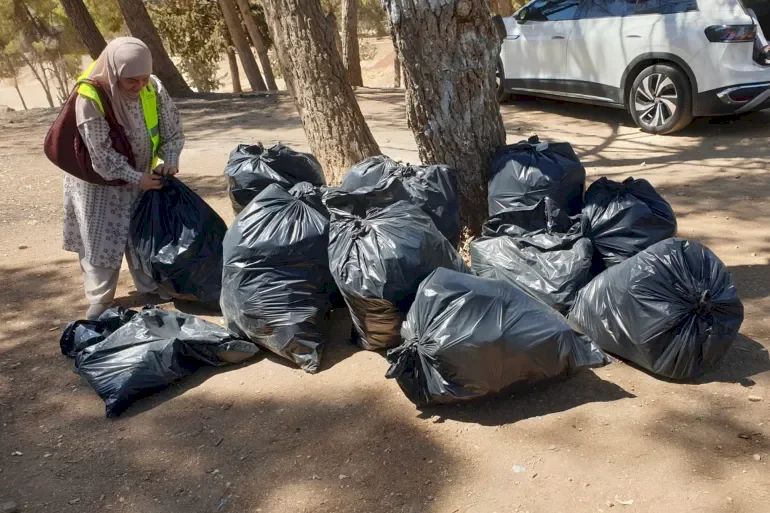
"Green Wheels" is a Jordanian Initiative Turning Plastic Waste into Charity
SadaNews - Amid colorful stacked bags and hands gathering pieces of plastic one after another, responsibility is reflected in the eyes of the volunteers participating in the "Green Wheels" initiative in Jordan, as part of a community effort to tackle the plastic recycling problem in ways that create opportunities for citizens.
What seems like mere caps from soda or juice bottles has, thanks to the efforts of youth over the past years, transformed into a large community initiative that addresses one of the most prominent environmental hazards in Jordan, while simultaneously providing funding for humanitarian projects, the latest of which is contributing to the construction of a school dedicated to individuals with disabilities.
The initiative's founder, Raida Sabha, says, "The idea was born from a video clip showing dead birds on a remote island after ingesting small plastic caps," adding, "We realized that a plastic cap is not just a neglected piece, but a small bullet capable of killing a bird or damaging an animal's stomach or polluting the environment for generations. Therefore, we decided to make these small pieces an entry point for a recycling culture in Jordan."
Sabha explains that the focus on caps came for both practical and environmental reasons, as they are more dangerous to animals than the bottles themselves, are more concentrated in terms of plastic chemically, and are easy to collect and store. Children even started to treat them as colored "LEGO" pieces, encouraging schools and families to engage in the campaign.
Substantial Waste
Plastic waste constitutes 15% to 20% of the solid waste volume in Jordan, which is approximately 405,000 tons annually out of a total of 2.7 million tons, according to a joint study prepared by the Ministry of Environment and the World Bank in 2023.
According to the study, about 135,000 tons end up in sanitary landfills, while approximately 129,000 tons leak into the environment, representing an increasing burden on public health and ecological systems.
The Ministry of Environment points out that Jordan recycles only 7% of its solid waste annually, a modest percentage that it seeks to increase through awareness programs, campaigns, and partnerships with the private sector and civil society. Over the years, the impact of the "Green Wheels" initiative, which dates back to 2014, has not only been limited to raising environmental awareness but has translated into tangible results.
It has contributed to supporting children with cerebral palsy, securing wheelchairs for individuals with disabilities, and sponsoring other social initiatives that have had a direct impact on the lives of dozens of families through recycling plastic waste and donating the proceeds to organizations that care for humanitarian affairs.
"Recycle It and Help Others"
Alongside the growth of the initiative, engagement has increased from government and private institutions, schools, and universities, creating a remarkable community case.
The latest event, titled "Recycle It and Help Others," was organized on Saturday by the Chemical Engineering Section of the Jordanian Engineers Association at Ghamdan Park in Amman.
Volunteers of various ages participated, and a large amount of bottle caps was collected in preparation for sending them to the "Green Wheels" initiative, with the proceeds directed towards building the first school and national center for rehabilitating children with cerebral palsy, the new goal adopted by the initiative after it officially moved under the umbrella of the "Zaha Cultural Center" to ensure its sustainability.
The head of the social committee in the Chemical Engineering Section of the association, Reem Al-Traifi, confirms the determination to add a humanitarian facet to the initiative.
She said, "We wanted to add an environmental and humanitarian dimension to the campaign. Plastic takes hundreds of years to decompose, and during that time, it pollutes the soil, water, and air and causes serious immune and hormonal diseases. When burned, it produces harmful gases that lead to respiratory diseases."
Expanding the Scope
She explains that the event focused on collecting commonly used plastic types such as (PP) and (PET) used in water and juice bottles and single-use cups for ease of recycling, emphasizing that what was collected was sent to the Green Wheels initiative to turn this waste into real value.
Meanwhile, the initiative coordinator at the Zaha Cultural Center, Yasmin Al-Rababa'a, clarifies to Al Jazeera Net that the center works on sustaining and developing this project by expanding the implementation scope, as it now includes 70% of hotels in Jordan, over 100 schools, and 25 branches of the center, along with collaborations with embassies, government institutions, and public and private companies.
She reported the use of innovative components in the initiative, such as smart machines for collecting plastic bottles and more than 100 dedicated bins for collecting plastic, while stimulating self-initiatives among community segments, especially children.
It is worth mentioning that UN estimates indicate that over 430 million tons of plastic are produced annually worldwide, with half of this amount designed for single-use only. About 23 million tons of this plastic end up in lakes, rivers, and oceans each year, with only about 10% of the total plastic produced annually being recycled in various countries.
Source: Al Jazeera

Scientists Attempt to "Intercept Cancer" Before Its Formation.. Know the Details

American Fact-Checking Platform Exposes Trump's Exaggerations in State of the Union Addres...

How Mourinho Deceived Everyone and Watched the Match Between Real Madrid and Benfica from...

Fat Loss Improves Blood Pressure and Supports Immunity

Galaxy S26 Armed with a Smart Feature to Combat the Most Dangerous Threats to Smartphones

Discovery of Microplastic Particles in 90% of Prostate Cancer Cases

Artificial Intelligence Diagnoses Children's Brain Tumors with 92% Accuracy Without Surger...

